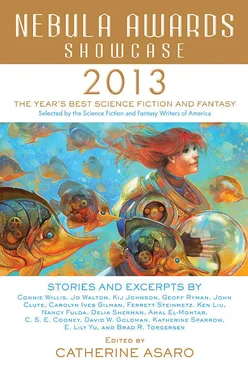It was impressive stuff. She threw herself into it unlike anything I’d ever seen before. Vistas and landscapes, stars and planets, and people. Lots of people. Lots of filtered representations of Lucille, usually sad. I dutifully recorded it all onto the family portable drive where I hoped, perhaps one day, if humanity made it out of this hole alive, Jenna’s work might find a wider audience. She’d certainly won over many of the other people on Deepwater 12, and was even getting some nice feedback from some of the other stations as well.
In retrospect, I probably should have seen the obvious.
All of Jenna’s art—with rare exception—had one thematic element in common.
It all featured the sun . In one form or another. Sometimes as the focus of the work, but more often as merely an element.
All kids do it, right? The ubiquitous yellow ball in the crayon sky, with yellow lines sprouting out of it? Only, Jenna’s suns were warmer, more varied in hue and color. They became characters in their own right. When she discovered how to use the animation software on the pad, she went whole-hog building breathtaking sequences of the sun rising, the sun setting; people and families frolicking beneath our benevolent yellow dwarf star called Sol.
If ever the aliens who’d taken our star from us entered Jenna’s mind, it didn’t show up in her work. But then, few of us thought of the aliens in any real sense anymore. They’d come, and so far as we knew, they’d gone. Dealing with the repercussions of their single, apocalyptic action had become far, far more important to all of us than dealing with the aliens themselves.
I remembered this as Number 6 creaked and groaned around me, the pressure warning lights letting me know that I was coming up too quickly—risking structural damage if I didn’t bleed off pressure differences between the inside and the outside of the sub.
Dan wasn’t with me. I’d convinced him to go back and let the others know about the Glimmer Club, and what the kids had done with Deepwater 3 behind our backs. He’d also been tasked with explaining why I’d disobeyed direct orders from a crew boss, risking my life and the old sub to chase a wild hair through the vast, dark ocean.
I couldn’t be sure I was right. All I had to go on was a short conversation I’d had with Jenna on her 15th birthday, just a few months earlier.
At that age she spent most of her time with the other teens on the station, as teenagers throughout history have always been prone to do. Old me had stopped being the focus of her attention right about the time she’d hit puberty.
Which was why that particular conversation stood out.
“Dad,” she said, “Does anyone ever go check anymore?”
“On what?”
“On the surface. Up top.”
“We used to send people all the time, but the thicker the ice got—-especially when the equator closed over—the less point there seemed to be in it. So I don’t think anyone has tried in several years.”
“Why not? We can’t just give up, can we? I mean, why are we doing any of this if people aren’t going to ever go back to the surface?”
She had a good point. I am afraid I hemmed and hawed my way through that one, leaving her with a perplexed and somewhat unhappy expression on her face. If any of her friends had gotten better answers from their parents, I never found out. Though I now suspected that our big failure as adults had been our inability to imagine that our children wouldn’t be satisfied to just scratch out a living on the ocean floor.
We who’d been through the freeze-out from the surface, we’d seen the destruction and the death brought by the forever night. We felt fortunate to be where we were. Alive.
But our kids? For them, the ice layer on the surface had become a thing of myth. An impenetrable but invisible bogey monster, forever warned about, but never seen nor experienced. For the Glimmer Club, I suspect, it got to the point where they wondered if all of the adults weren’t crazy, or conspiring in a plot. How did anyone really know that the surface was frozen over? That aliens had blocked the sun?
To blindly accept a fundamental social truth upon which everyone agrees, is just part of what makes us human.
But in every era, however dark or desperate, there have also always been hopeful questioners.
* * *
I’d not slept for almost two days, and knew it when I caught myself slumped at the controls, chin in my chest; the sub’s primitive autopilot beeping plaintively at me.
Sonar pings still didn’t show me any subs.
But they hadn’t shown me the underside of the ice sheet yet, either.
I used the sub’s computer to run some calculations—based on the last known measurements to have been taken on the ice sheet’s thickness. I used these to double check where I thought I was, versus what the instruments were telling me, and sat back to ponder.
Assuming the Glimmer Club had ascended as a group, without significant deviation—because the subs only have so much air and battery life to go around—I’d expected to spot them by now. Or at least hear them. Several quick pauses to capture and analyze ambient water noise had yielded depressing silence. Not even the cry of whales filled the sea anymore, because the whales and other sea mammals had all died out together.
If the aliens had had no regard for human sapience, what about the other intelligent creatures who had once called the Earth home?
If ever the oceans re-opened and humans reclaimed the planet, we’d find it an awfully empty place.
Exhausted, I kept going up.
* * *
Sonar pingbacks brought me awake the second time. There. A single object, roughly about the size of a sub. It was drifting ever so lazily back towards the bottom.
I spent a few minutes echo-locating, and when I did, my blood ran cold. There was a big crack in the pilot’s canopy and the top hatch was hanging open. Dreading what I might find, I pointed my lights into the canopy and examined the interior of the little sub, down its entire length. If I’d expected to see bodies, I was relieved to see only emptiness. Trained from birth to salvage, they’d stripped the sub and continued on.
Wherever that happened to be.
Additional sonar pings sent back nothing. The ocean was silent in all directions, as black and lonely as space had ever been. On instinct alone, I resumed the long voyage to the ice.
* * *
The gentle rocking of the sub wasn’t what woke me.
It was the occasional thumping against the hull.
I sat straight up, almost ripping my headset off in the process My neck and back hurt, and my hands were unsteady as I grasped the controls.
No telling how long I’d been out that time. I scanned the control board and the autopilot seemed satisfied. When I saw that the depth gauge read zero, I had to tap the screen a few times. Something had to be wrong. The knocking on the hull suggested I’d found the lower boundary of the ice sheet, where the sea water grudgingly turned to sludge. I’d never actually been up this high since the oceans closed over, so maybe the equipment was wonky this close to the frozen crust?
I hit my lights, but just a few of them because I didn’t have all the battery life left in the world.
It took me at least a minute to figure out what I was seeing.
A lapping line of water sloshed halfway up the canopy.
Had I drifted into an air pocket on the underside of the ice?
Scanning upward with the lights revealed nothing but blackness.
But wait, not black blackness. There was a distinct hint of color in the void.
I slowly reached a hand down and flicked the lights off, letting the gentle rocking of the boat and the knocking of the hull fill my ears. The blackness was pinpricked with white dots, and there was a gloaming light in the very far distance. Only, gloaming wasn’t the right word. The light slowly but perceptibly began to grow in strength, and the blackness overhead began to graduate from obsidian, to purple, and finally flared into dark blue at the far, far horizon.
Читать дальше












